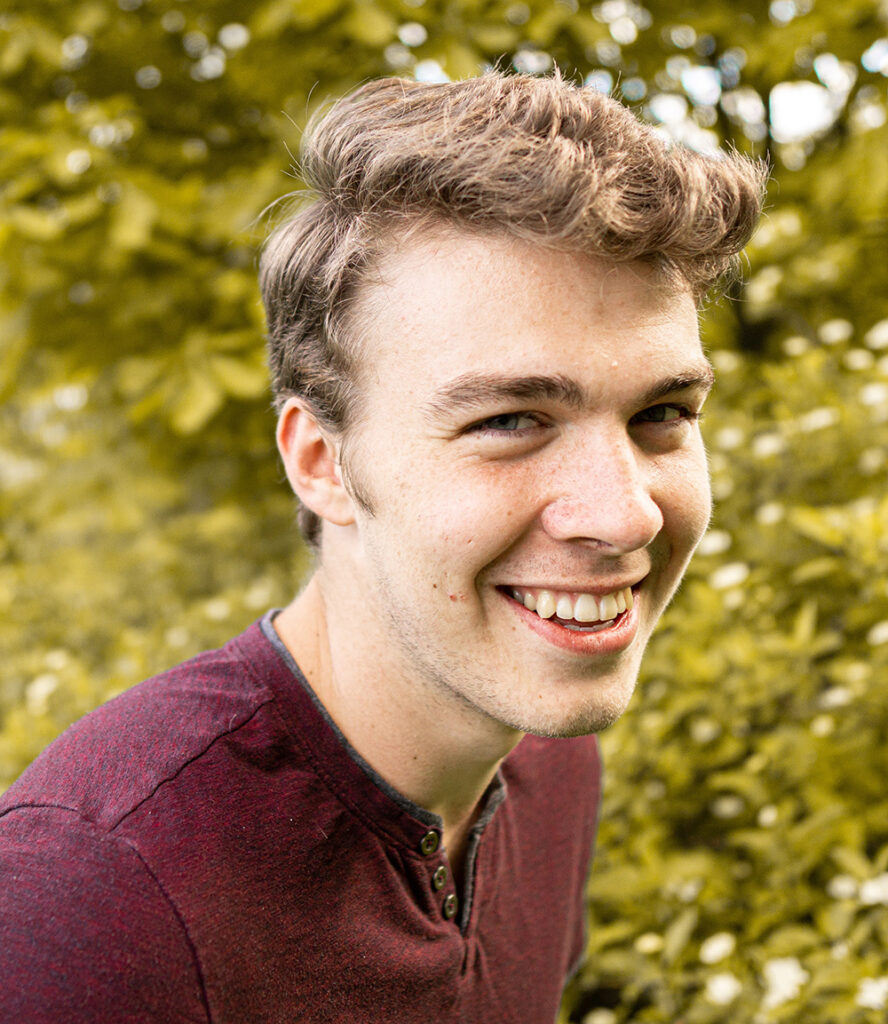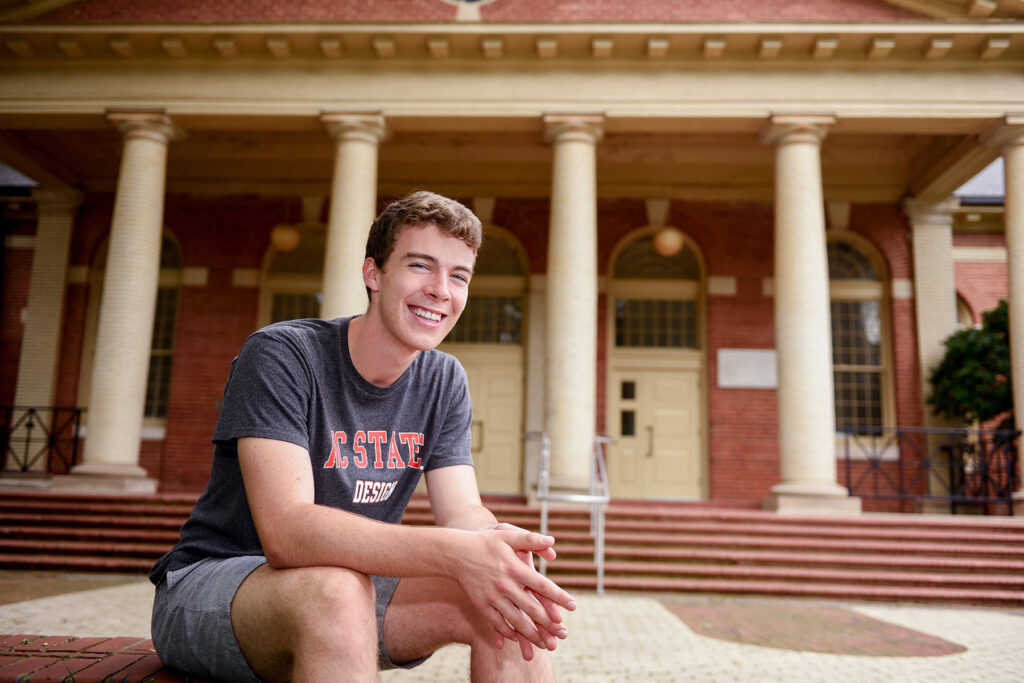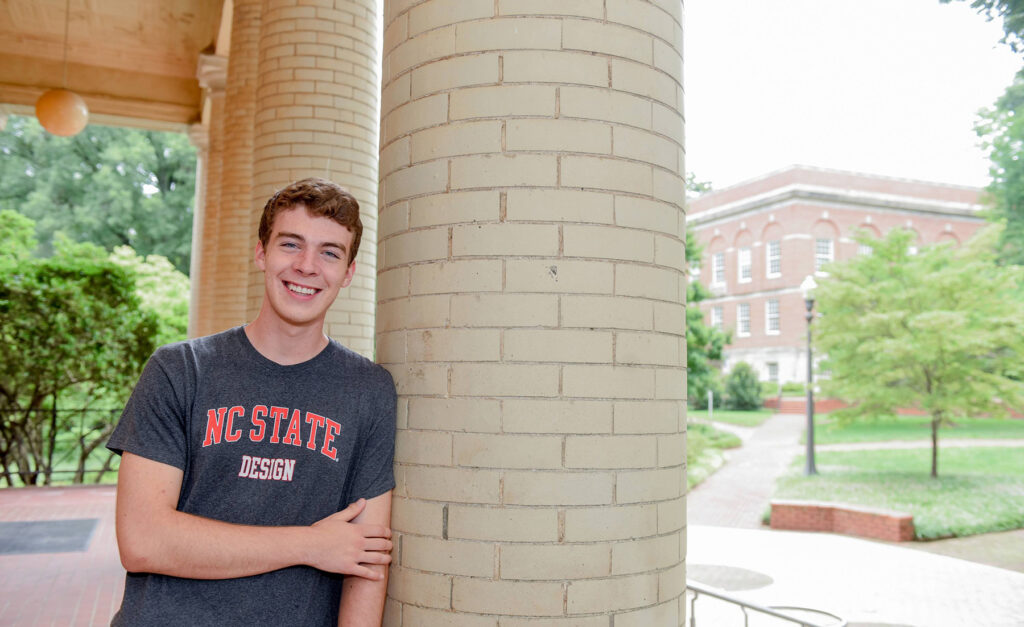The Park Scholarships Diversity Student Task Force has compiled profiles of Park Scholars, Park Faculty Scholars, and Selection Committee Members designed to give prospective students insight about the Park Scholarships program, the selection process, and how scholars made the decision to join the Wolfpack.

Name: Micah Holdsworth
Hometown: Antalya, Turkey
Class Year: 2022
Major: BEDA (Bachelor of Environmental Design in Architecture)
Role within Park Scholarships: Park Scholar
1. Tell us a little more about who you are, your background, and identity.
I was born in Istanbul, Turkey to North American-born parents from Virginia and Ontario. I studied at a Turkish public school from kindergarten through eighth grade, yet I also had many ex-pat friends and acquaintances from various European countries as well the U.S. and Canada. Growing up with such a significant cultural and linguistic split in my social circle, I developed the ability to acclimate to my surrounding contexts with ease. However, with adaptability came a significant struggle in identity, especially in my formative early teens. There were also many opportunities that came with being in a multi-cultural context, such as being able to volunteer at a self-supported Syrian refugee school while simultaneously working on my Eagle Scout rank through a Boy Scouts council based out of Italy. Without the connections to both my Turkish and ex-pat communities, I likely wouldn’t have had the opportunity to realize my desire to lead service projects so early on in my life.
2. What are you involved with on/off-campus? What are you passionate about?
The primary reason that I chose to study architecture was that I recognized its massive propensity for bringing significant, innovative, and sustainable change in developing communities. Thus, much of my on/off-campus involvement has revolved around experimenting with the role of design-thinking in a nonprofit context.
On-campus, I have been involved with the student-led nonprofit, 321 Coffee, by participating in meetings about the design of their coffeeshop space at the local Farmer’s Market and offering advice about decision-making and making architectural renderings. I also designed the student-run organization Musical Empowerment’s website with fellow Park Scholar Daniel Toole ’22 as a part of my CEI project. Beyond design-related service efforts, I volunteered with College Mentors, mentoring elementary school-aged kids with the hope of encouraging them to discover their passions, providing a solid example of how to treat others around them, and showing them the value of their education. I am also very passionate about my faith as a follower of Jesus and have been highly involved in various campus ministries throughout my time at NC State.
Off-campus, I was part of a team of AmeriCorps participants and international architecture students and young professionals in a summer design-build project in Lakeside, Montana for a local elementary school. Working with the nonprofit architecture firm 100 Fold Studio over the course of the project was a formative experience for me both as a student of architecture and as a person.
3. Why did you decide to choose NC State and the Park Scholarships program? What interested you the most about the Park program as a high schooler?
NC State was already a place that I was excited to be on based on my campus visit, and my interactions with the Park alumni that I contacted during my decision-making process only served to take me from excited to ecstatic. Simply put, I had never been surrounded by a plethora of resources like that represented by the billion-dollar campus of NC State. That, in itself, is a massive privilege – and the idea of having an office of people advocating for me and 160 others’ development in leadership, service, scholarship, and character blew my mind. Recognizing the generosity and opportunity for growth represented by the Park Scholarships program, I knew that I had to seriously consider it. In the end, however, what made me choose the Park Scholarships program and NC State over similar programs was the kindness of the Park community that I experienced during Finalist Selection Activities, particularly from my host and now dear friend, David Flowers ’21.

4. How did you find out about the Park Scholarships program?
My dad was a powerhouse of research during the summer before my senior year of high school and found the Park Scholarships program while we were considering the opportunities, costs, and architecture programs at various universities on the east coast. I had visited NC State, along with six other universities during my junior year, and had a wonderful impression of State’s campus. Despite not expecting to get the Park Scholarship, I decided it was worth putting forth my best effort.
5. In high school, what were you most proud to share in your Park application?
A significant amount of my pre-teen and early teen years were spent hiking in mountains and camping near ancient ruins. Most of these formative, adventurous experiences were made possible by my involvement in a Boy Scout troop based out of the Transatlantic Council in Italy. Learning various survival and emergency skills in a natural, intimate setting alongside genuine friends, and under the mentorship of a man I could look up to was more validating and empowering than I can put into words. Thus, being able to follow through and earn the rank of Eagle Scout was something I was and am proud of not because of my own dedication, but because of my growth as a person throughout those years. Writing about Boy Scouts in my Park application was likely the easiest part of it.
6. What fear(s) did you have while applying to the Park Scholarships program? Have you found them to be true?
Like many applicants to the Park Scholarships program, I suffered from “imposter syndrome.” At each step of the Park application, there was a small voice in my head that told me that I had tricked my way this far, or that I had only got this far because I grew up in Turkey. Looking back, even though I still occasionally doubt myself and my contributions to the Park Scholarships community, I realize that was quite an arrogant lie that I told myself. The Park Scholarships staff are very skilled at seeing potential and reading people, and there is a reason that each one of us is chosen to be a Park Scholar. Yes, I’m not always as diligent as I should be, and I don’t take every opportunity to contribute to the Park community that I could, but I’m appreciated for who I am and the perspective that I bring to the table.
7. What advice might you give a high-schooler who is considering applying for the Park Scholarship?
Don’t doubt yourself even if you’re awed by the other applicants. Take the wonderfully comprehensive application and use it as a learning opportunity to reflect on who you are and your experiences. Reach out to as many Park alumni and current Park Scholars as you can or want to – I’m certain that they’d love to talk to you and give you advice. It’s the Park community that you’ll fall in love with and getting a head start on getting to know us will only make you more excited and motivated in the application process. Lastly, ask great questions and really try to listen to the stories and experiences of the people you meet in this process; don’t merely parrot your achievements. You have more to learn than you have to give.

8. Is there a certain pillar that particularly resonates with you? Why?
From the very first time I read about the four pillars of the Park Scholarships program on the website, I was struck by the importance given to character. Difficult to quantify yet so easily borne witness to, character is the key to using scholarship, leadership, and service in a way that propagates positive change in society. The Park staff have been clear to communicate that good character is not simply having equal good intentions. Maintaining a lifestyle guided by good character necessitates being intentional, having integrity, and staying informed on issues and dynamics that may affect your respective communities. On a more personal note, good character is something I was taught to value in others around me above all else, and it’s very affirming to see the Park Scholarships program upholding it as a primary focus.
9. What do you value most about fellow Park Scholars? What might you hope to see in prospective scholars?
I highly value my fellow Park Scholars’ shared desire to make an impact on and beyond the university campus. I have no doubt that most of my peers in Park Scholarships see their time in the program as an investment for the current and future betterment of our various communities. In my experience, this desire to affect their surroundings positively and progressively comes from a genuine love for people and a conviction to use the privilege they’ve been given responsibly. I hope to see a similar intentionality and love for serving people in prospective scholars.
10. Can you share an important college experience that was made possible by the program?
In the fall of my sophomore year, I had the opportunity to go to Washington, D.C., with my Park Scholarships class for Learning Lab II to learn from people in leadership dealing with the issue of mass incarceration reform. Aside from being an enjoyable and memorable trip with my friends, learning about mass incarceration reform was a truly life-changing experience for me. Not only was I being thoroughly informed about an important issue that affects society on every level, I was being made aware of my own complacency and ignorance on the depth and influence of racism in America. As I heard from an ex-federal prosecutor about the injustices of the Department of Justice and listened to the story of a wrongfully incarcerated Black man who now goes back into prisons to spread hope in the form of poetry, my interest in justice began to grow tenfold.
That experience led to a further sensitivity to the way that the deep roots of racism have and continue to influence every fiber of American society. In the spring of my sophomore year, both of my architecture studio projects were focused on acknowledging and addressing racial disparities in the urban planning of the city of Charlottesville, VA, through architecture. Now, with general awareness of societal injustices increasing at a rapid level due to social media, my desire to learn about these issues has extended beyond systemic racism to immigration, gender inequalities, and human trafficking. I know that this longing for justice that has been developing in me over the past year will affect my life and career choices from this point on. Looking back, I can see that the Learning Lab II trip to D.C. with my Park Scholarships class has led me on a path of growing in sensitivity to and passion for justice on both local and international levels.
11. What is one thing someone might not know about you as a Park Scholar?
Recently, my older brother asked me if I am comfortable with who I am. His question took me by surprise, but upon consideration I answered: “not yet.” My path to understanding and being okay with who I am has taken much self-reflection and processing of the uncomfortable, and the enneagram has been a useful tool in this endeavor of mine. The enneagram is a thorough personality test meant to help reveal tendencies relating to the “why” (motivations) of the human psyche. I am an 8 wing 7, sometimes called “the Maverick” or “the Challenger.” This is not “who” I am, but it has helped me more objectively analyze “why” I act the way that I do.
Growing up, I remember feeling ashamed of my prideful personality because I often had trouble focusing in lectures or conversations I wasn’t directly involved in. I always felt a certain power over people and was afraid of my ability to notice brokenness in people. At times I self-sabotaged during periods of academic and athletic success because I feared discouraging my friends and siblings.
Through studying my enneagram in a professional setting I’ve been able to recognize that 8s want to feel valued and often have difficulty staying attentive if not directly engaged. I’ve identified that my feelings of influence over and responsibility for others around me come from a natural tendency to be assertive and a desire to improve the lives of people around me. This is only the tip of the iceberg, but more concisely stated, I’m on a journey of understanding myself and by doing so, I’m turning constraints into opportunities and fears into tools to love better.
12. What have you learned about the Park Scholarships program since becoming a scholar that was surprising or that you weren’t expecting?
I have been surprised at the plethora of ways leaders present themselves in the Park community. There are so many different people with different life experiences, skillsets, and leadership tendencies, yet our desires to learn and serve together unite us beautifully. We, as people are not and never will be perfect fits, but we each bring something to the table, and we respect each other for it. The Park Scholarships program has a lot of room to grow in diversity and representation, but even within the current state, I’ve been continually impressed by the unique niches that each of us have found in a couple years together.